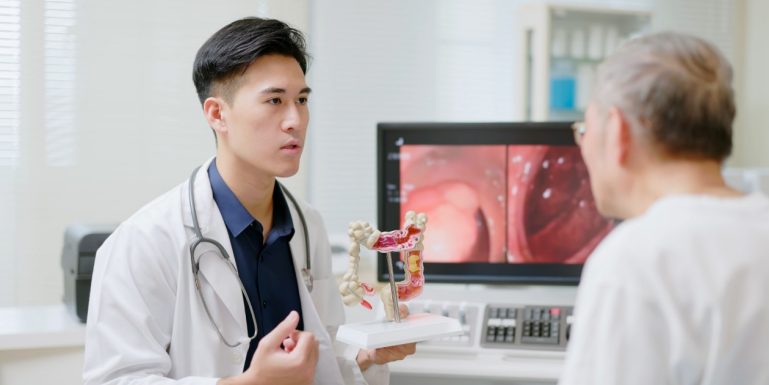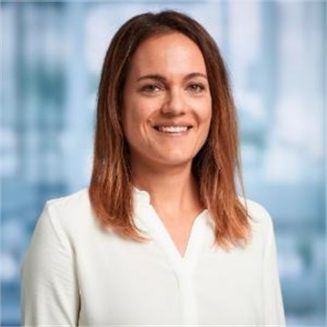
Bowel cancer: early detection methods
When does a colonoscopy make sense? Can you detect bowel cancer with a blood test? Is a colonoscopy part of the bowel cancer screening programme in Switzerland? Find out what you can do to prevent bowel cancer.
Bowel cancer: early detection methods
Bowel cancer is the third most common form of cancer in Switzerland. Every year, around 4,300 people are diagnosed with it. The most common forms are rectal cancer or large bowel cancer (also known as colon cancer). Small bowel cancer is rare. People over 50 are most affected. Bowel cancer often develops from benign growths that change over time. These tissue changes are called polyps. Bowel cancer can be prevented in many cases by identifying and removing these polyps at an early stage.
Recommended examinations for the early detection of bowel cancer include testing for blood in the stool and colonoscopies. Regular bowel cancer screening increases the likelihood of detecting abnormal changes in good time. More than nine out of ten patients can be cured if the tumour is detected early on.
There are early detection programmes for bowel cancer in some cantons and regions in Switzerland, where people aged between 50 and 69 are invited for regular screenings. Participants can choose between a faecal immunochemical test (FIT) every two years or a colonoscopy every ten years. The costs are covered under the basic insurance provided by their health insurer. In Switzerland, health insurers cover the costs of bowel cancer screening for people under the age of 50 if this is medically necessary.
Find out about the services that are available in your canton, and talk to your doctor about what early detection strategy makes sense for you.
Bowel cancer screening via colonoscopy
A colonoscopy is one of the most reliable medical checkups there is. Bowel cancer generally has no symptoms in its early stages. The colonoscopy enables the early detection of bowel cancer before symptoms such as changes in bowel movements or persistent abdominal pain occur.
During a colonoscopy, the doctor examines the entire large bowel using a flexible endoscope. A small camera transmits images of the intestinal mucosa to a monitor. If the medical specialist finds any mucosal growths, they remove them straight away if possible. A colonoscopy does not require anaesthesia, but you may request a mild sedative or sleeping aid.
Colonoscopy: preparation and procedure
A colonoscopy requires careful preparation. You must adjust your diet a few days before the examination. An empty bowel improves visibility and makes the results of the examination more informative. A colonoscopy is generally an outpatient treatment: most patients leave the practice or clinic the same day. As you will generally receive a sedative or sleeping aid, you mustn’t drive after the examination. It’s best to take someone with you or use public transport. Tell your doctor in good time if you take any medication. For example, you will need to stop taking blood thinners beforehand.
A colonoscopy follows a standardised procedure enabling a precise examination:
- Bowel cleansing: an empty bowel is important for a successful colonoscopy. To ensure this, you take a laxative – generally in the evening and morning before the examination. Drinking this special solution will empty your bowel completely. Avoid foods that are hard to digest for a few days before your appointment. You will receive more detailed written information from your doctor beforehand.
- Preliminary consultation: before the examination, your doctor will talk you through the procedure and tell you about the potential risks. They will provide you with comprehensive information, address any concerns you may have and obtain your consent for the colonoscopy.
- Sedation: you will either be awake or mildly sedated during the colonoscopy. You will discuss this beforehand with your doctor.
- Colonoscopy: the doctor will carefully guide an endoscope through your anus and into your rectum and push it through your large bowel into your small bowel. They will pump gas into your bowels to open them up. The medical professional will carefully examine the intestinal mucosa as they slowly remove the endoscope. They will recognise any anomalies, such as polyps, and remove them straight away if possible. If necessary, the medical specialist will also take tissue samples from the intestinal mucosa. A colonoscopy generally takes between 30 and 45 minutes.
- Follow-up discussion: after the examination, the doctor will discuss the results of the colonoscopy with you. If they removed polyps or tissue samples, these will be examined in pathology. The doctor will tell you as soon as the results are available. If you were sedated, you will need to stay in the medical practice for a while for monitoring, after which you can go home.
Bowel cancer screening via stool test
Bowel cancer can also be detected without a colonoscopy. One of the recommended alternative procedures is the FIT test (faecal immunochemical test). This is based on an immunological method that detects human haemoglobin in the stool.
You carry out the stool test for the early detection of bowel cancer at home. Using a special test tube, you take a small stool sample and send it to a laboratory. No special diet is required. The test result shows whether there is any blood in your stool. If the results are abnormal, further testing by means of a colonoscopy is necessary.
For many people, the new stool test method is less unpleasant than a colonoscopy. However, the stool test only detects precancerous growths in the bowel if they are already advanced and bleeding. A colonoscopy, on the other hand, enables a direct look at the intestinal mucosa and can detect precancerous growths.
As a result, colonoscopies are therefore particularly suitable for people at increased risk. These include those with bowel cancer in the family, chronic inflammatory bowel conditions or abnormal stool findings. This examination is also recommended for people with persistent complaints such as unwanted weight loss or frequent digestive problems. Consult a doctor to find out whether a stool test is a better option for you than a colonoscopy.
Is it possible to prevent bowel cancer?
You cannot prevent bowel cancer entirely, but you can reduce the risk of developing it. Make sure you eat a balanced diet with plenty of fibre. A balanced diet that can help to prevent bowel cancer contains lots of fruit and vegetables as well as wholegrain products, with only small amounts of red and processed meat. Also make sure you get enough exercise and avoid nicotine and excessive alcohol consumption.
People with a family history of bowel cancer have an increased risk of developing it themselves. Does this mean that these people should be screened for bowel cancer from the age of 35? It’s not possible to provide a general answer to this question. Talk to your doctor: they will tell you when it would be advisable to start early detection screening.
A healthy lifestyle, ideally combined with regular medical checkups, will improve your well-being. Your doctor will provide you with comprehensive information about suitable bowel cancer screening measures. By making conscious decisions, you can make a positive contribution towards your health.

The specialist provided the editorial team with advice and input for this article. Monica Reusser (medical assistant, MAS health promotion) works in the Helsana Health Consultation Service.


Newsletter
Find out more about current health issues every month and get all the information you need about our attractive offers from all Helsana Group companies * delivered by e-mail to read whenever it suits you. Our newsletter is free of charge and you can sign up here:
We did not receive your information. Please try again later.
* The Helsana Group comprises Helsana Insurance Company Ltd, Helsana Supplementary Insurances Ltd and Helsana Accidents Ltd.